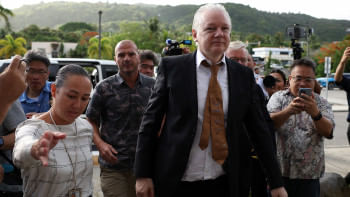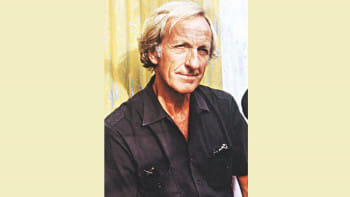You Saved Julian Assange

The dark machinery of empire, whose mendacity and savagery Julian Assange exposed to the world, spent 14 years trying to destroy him. They cut him off from his funding, cancelling his bank accounts and credit cards. They invented bogus allegations of sexual assault to get him extradited to Sweden, where he would then be shipped to the US.
They trapped him in the Ecuadorean Embassy in London for seven years after he was given political asylum and Ecuadorian citizenship by refusing him safe passage to Heathrow Airport. They orchestrated a change of government in Ecuador that saw him stripped of his asylum, harassed and humiliated by a pliant embassy staff. They contracted the Spanish security firm UC global in the embassy to record all his conversations, including those with his attorneys.
The CIA discussed kidnapping or assassinating him. They arranged for London's Metropolitan Police to raid the embassy—sovereign territory of Ecuador—and seize him. They held him for five years in the high security HM Prison Belmarsh, often in solitary confinement.
And all the while they carried out a judicial farce in the British courts where due process was ignored so an Australian citizen, whose publication was not based in the US and who, like all journalists, received documents from whistleblowers, could be charged under the Espionage Act.
They tried over and over and over to destroy him. They failed. But Julian was not released because the courts defended the rule of law and exonerated a man who had not committed a crime. He was not released because the Biden White House and the intelligence community have a conscience. He was not released because the news organisations that published his revelations and then threw him under the bus, carrying out a vicious smear campaign, pressured the US government.
He was released—granted a plea deal with the US Justice Department, according to court documents—in spite of these institutions. He was released because day after day, week after week, year after year, hundreds of thousands of people around the globe mobilised to decry the imprisonment of the most important journalist of our generation. Without this mobilisation, Julian would not be free.
Mass protests do not always work. The genocide in Gaza continues to exact its gruesome toll on Palestinians. Mumia Abu-Jamal is still locked up in a Pennsylvania prison. The fossil fuel industry ravages the planet. But it is the most potent weapon we have to defend ourselves from tyranny.
This sustained pressure—during a London hearing in 2020, to my delight, District Judge Vanessa Baraitser of the Old Bailey court overseeing Julian's case, complained about the noise protestors were making in the street outside—shines a continuous light on injustice and exposes the amorality of the ruling class. This is why spaces in the British courts were so limited and blurry eyed activists lined up outside as early as 4am to secure a seat for journalists they respected, my spot secured by Franco Manzi, a retired policeman.
These people are unsung and often unknown. But they are heroes. They move mountains. They surrounded parliament. They stood in the pouring rain outside the courts. They were dogged and steadfast. They made their collective voices heard. They saved Julian. And as this dreadful saga ends, and Julian and his family I hope, find peace and healing in Australia, we must honour them. They shamed the politicians in Australia to stand up for Julian, an Australian citizen, and finally Britain and the US had to give up. I do not say to do the right thing. This was a surrender. We should be proud of it.
I met Julian when I accompanied his attorney, Michael Ratner, to meetings in the Ecuadorian Embassy in London. Michael, one of the great civil rights attorneys of our era, stressed that popular protest was a vital component in every case he brought against the state. Without it, the state could carry out its persecution of dissidents, disregard for the law and crimes in darkness.
People like Michael, along with Jennifer Robinson, Stella Assange, WikiLeaks Editor-in-Chief Kristinn Hrafnsson, Nils Melzer, Craig Murray, Roger Waters, Ai WeiWei, John Pilger and Julian's father John Shipton and brother Gabriel, were instrumental in the fight. But they could not have done it alone.
We desperately need mass movements. The climate crisis is accelerating. The world, with the exception of Yemen, stands passive watching a live streamed genocide. The senseless greed of limitless capitalist expansion has turned everything from human beings to the natural world into commodities that are exploited until exhaustion or collapse. The decimation of civil liberties has shackled us, as Julian warned, to an interconnected security and surveillance apparatus that stretches across the globe.
The ruling global class has shown its hand. It intends, in the global north, to build climate fortresses and in the global south to use its industrial weapons to lock out and slaughter the desperate the way it is slaughtering the Palestinians.
State surveillance is far more intrusive than that employed by past totalitarian regimes. Critics and dissidents are easily marginalised or silenced on digital platforms. This totalitarian structure—the political philosopher Sheldon Wolin called it "inverted totalitarianism"—is being imposed by degrees. Julian warned us. As the power structure feels threatened by a restive population that repudiates its corruption, amassing of obscene levels of wealth, endless wars, ineptitude and mounting repression, the fangs it exposed to Julian will be exposed to us.
The goal of wholesale surveillance, as Hannah Arendt writes in The Origins of Totalitarianism, is not, in the end, to discover crimes, "but to be on hand when the government decides to arrest a certain category of the population." And because our emails, phone conversations, web searches and geographical movements are recorded and stored in perpetuity in government databases, because we are the most photographed and followed population in human history, there will be more than enough "evidence" to seize us should the state deem it necessary. This constant surveillance and personal data wait like a deadly virus inside government vaults to be turned against us. It does not matter how trivial or innocent that information is. In totalitarian states, justice, like truth, is irrelevant.
The object of all totalitarian systems is to inculcate a climate of fear to paralyse a captive population. Citizens seek security in the structures that oppress them. Imprisonment, torture and murder are saved for unmanageable renegades such as Julian. The totalitarian state achieves this control, Arendt wrote, by crushing human spontaneity, and by extension human freedom. The population is immobilised by trauma. The courts, along with legislative bodies, legalise state crimes. We saw all this in the persecution of Julian. It is an ominous harbinger of the future.
The corporate state must be destroyed if we are to restore our open society and save our planet. Its security apparatus must be dismantled. The mandarins who manage corporate totalitarianism, including the leaders of the two major political parties, fatuous academics, pundits and a bankrupt media, must be driven from the temples of power.
Mass street protests and prolonged civil disobedience are our only hope. A failure to rise up—which is what the corporate state is counting on—will see us enslaved and the earth's ecosystem become inhospitable to human habitation. Let us take a lesson from the courageous men and women who took to the streets for 14 years to save Julian. They showed us how it is done.
Chris Hedges is a Pulitzer Prize–winning journalist who was a foreign correspondent for fifteen years for The New York Times, where he served as the Middle East Bureau Chief and Balkan Bureau Chief for the paper.
Views expressed in this article are the author's own.
Follow The Daily Star Opinion on Facebook for the latest opinions, commentaries and analyses by experts and professionals. To contribute your article or letter to The Daily Star Opinion, see our guidelines for submission.

 For all latest news, follow The Daily Star's Google News channel.
For all latest news, follow The Daily Star's Google News channel. 











Comments